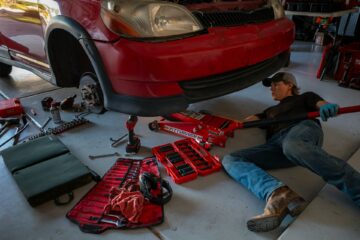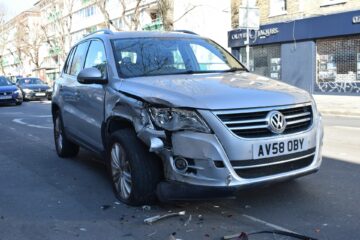Motorcycle accidents can happen in an instant — a sudden lane change, a distracted driver, or a road hazard that appears too late to avoid. Unlike car accidents, motorcyclists are far more exposed, which means injuries are often more serious and recovery takes longer.
In the aftermath of a crash, riders often feel overwhelmed, not just by physical pain but by uncertainty: What should I do right now? How do I protect myself? Can I afford medical bills?
This guide provides a complete, step-by-step action plan for motorcyclists to follow after an accident. From the crash scene to dealing with insurers, documenting your recovery, and finding legal help, each step matters.
Step 1: Call 911 and Put Safety First
Your first priority after a crash is safety and medical care.
- Call 911 immediately. Even if you think your injuries are minor, adrenaline can hide trauma like concussions, internal bleeding, or fractures.
- Ask for a police officer to file a report. That official document is critical evidence for your claim.
- Move to safety if possible. If your bike is in the middle of traffic and it’s dangerous to stay there, move yourself to a safe location until help arrives.
⚠️ Tip: Never assume you’re “fine” after a crash. Always get checked by paramedics or go to the ER. Documentation protects your health and your case.
Step 2: Gather Evidence at the Scene
Your smartphone is one of your most powerful tools. If you’re physically able, or if a passenger or bystander can help, start documenting.
Take photos of:
- Vehicle damage (both yours and others involved)
- Skid marks, debris, and road conditions
- Traffic signs, signals, or hazards (like potholes or construction zones)
- Your helmet, riding gear, and any visible injuries
📸 Pro tip: Capture wide shots of the scene and close-up detail shots. Include time-stamped photos if possible.
Step 3: Collect Witness Information
Eyewitnesses are invaluable. Don’t just rely on police reports — many witnesses leave before an officer can record their statements.
- Ask for names, phone numbers, and email addresses.
- If they’re hesitant, politely explain that their testimony could help establish the truth.
- Note if nearby businesses have security cameras that may have captured the accident.
📝 Action step: Store this information in a dedicated “Accident Folder” on your phone or in a notes app so it’s easy to share later.
Step 4: Avoid Recorded Statements to Insurance
Insurance companies often call within hours, hoping you’ll make a statement they can use against you.
- Do not give a recorded statement. Simply say: “I’m not prepared to discuss the details right now.”
- Stick to the basics: date, time, location, and your contact info.
- Never speculate about fault, speed, or what you “should have done.”
⚠️ Warning: Even innocent remarks like “I didn’t see them” or “I’m not that hurt” can later be twisted to minimize your claim.
Step 5: Preserve Physical Evidence
Your damaged gear tells a story.
- Keep your helmet, jacket, gloves, and boots. Even if destroyed, they demonstrate the force of impact.
- Save torn clothing, broken accessories, or anything that shows damage.
- Don’t repair your motorcycle before documenting its condition thoroughly.
Step 6: Track Your Medical Care and Recovery
Accident claims aren’t just about the crash itself — they’re about proving the impact on your life.
- Follow your doctor’s advice. Missing appointments can hurt both your recovery and your case.
- Keep receipts for all medical expenses, prescriptions, and therapy sessions.
- Maintain a recovery journal. Write down pain levels, daily challenges, missed work, and how your injuries affect your activities.
🗂️ Pro tip: Store all documentation in one folder or binder. Organized records make your claim stronger.
Step 7: Know Your Rights Under the Law
Motorcycle accident claims can be complex because fault isn’t always clear. In many states, including Nevada, comparative negligence laws apply. This means:
- You may still recover damages even if you’re partially at fault.
- Your compensation may be reduced by your percentage of fault.
- Insurance companies often exploit this law to argue the rider was careless.
📌 Key takeaway: Never assume you’re disqualified from compensation. Talk to a lawyer before making any conclusions.
Step 8: Contact a Motorcycle Accident Lawyer
Finally — and most importantly — consult with an attorney who understands motorcycle accidents specifically. These cases are not the same as car accidents.
An experienced lawyer will:
- Investigate the crash thoroughly
- Work with experts to reconstruct the accident
- Deal directly with insurers so you don’t have to
- Negotiate aggressively for maximum compensation
- Take the case to trial if needed
If you’d like to learn more about your rights and what steps to take after a motorcycle crash, visit Motorcycle Accident Lawyer Near Me in Las Vegas.
Prevention: Reducing Your Risk on the Road
While no one can prevent every accident, riders can reduce risks by practicing safe habits:
- Always wear protective gear. Helmets, jackets, gloves, and boots save lives.
- Stay visible. Use headlights, wear reflective clothing, and avoid blind spots.
- Follow traffic laws. Speeding or weaving between cars increases liability.
- Inspect your bike regularly. Tires, brakes, and lights should be checked before every ride.
Final Thoughts
A motorcycle accident can turn your life upside down in an instant. But the steps you take immediately afterward — from calling 911 to preserving evidence and contacting a lawyer — can make all the difference in your recovery.
As a rider, you already know the road carries risks. What matters most is being prepared, protecting your rights, and having the right support system if the worst happens.
If you’ve been injured in a motorcycle crash and want to understand your options, don’t wait. Visit Motorcycle Accident Lawyer Near Me in Las Vegas for resources, guidance, and a free consultation.












